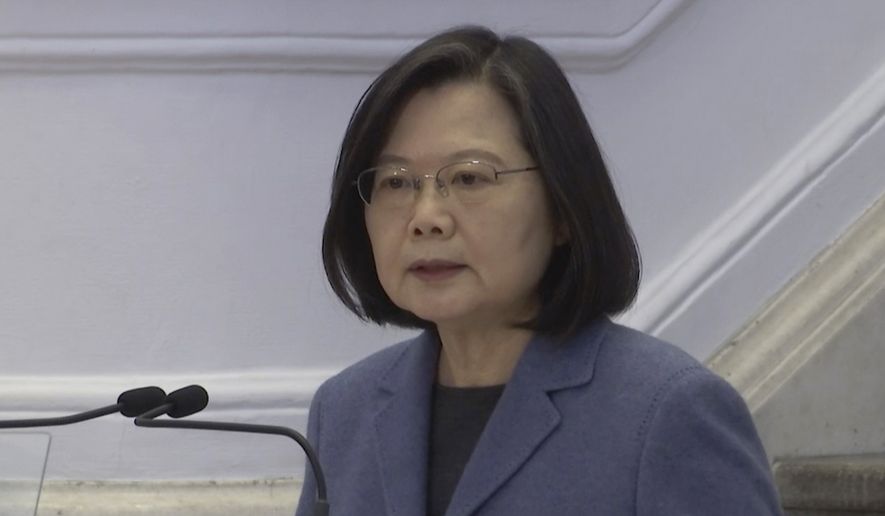The State Department on Saturday ended restrictions on diplomatic and military contacts with Taiwan in a move designed to upgrade ties with the island state and end “appeasement of China.”
The action by outgoing Secretary of State Mike Pompeo means senior U.S. civilian officials and military officers will now be free to travel to Taiwan.
In the past, most high-ranking military officers were banned from traveling to Taiwan and lower-ranking officers were not be allowed to wear military uniforms and had been forced to dress as civilians.
Senior government officials and diplomats also were barred from traveling in a bid to avoid upsetting Beijing.
The State Department announced this week that Kelly Craft, the U.S. ambassador to the United Nations, will travel to Taiwan. The announcement followed the latest crackdown by China on pro-democracy legislators in Hong Kong.
The move is expected to anger Beijing that has complained that the U.S. government is not following diplomatic communiques governing U.S.-China relations.
In Beijing, Chinese state media quoted Chinese Communist Party-approved experts denouncing the action.
Global Times, the CCP-affiliated outlet, said the loosing of restrictions will worsen U.S.-China relations and make it more difficult for the Biden administration to develop closer ties.
Li Haidong, professor at the Institute of International Relations of the China Foreign Affairs University, said China should conduct military exercises timed to Ms. Craft’s visit that would include aircraft flying over the 100-mile-wide Taiwan Strait as a “stern warning.”
“At this critical juncture, diplomacy should prevail, with the military as a secondary tool,” Mr. Li was quoted as saying.
Mr. Pompeo said in announcing the new policy that the complex self-imposed restrictions were taken unilaterally “in an attempt to appease the Communist regime in Beijing.”
“No more,” he said, adding that all the past limits are now lifted.
“Executive branch agencies should consider all ’contact guidelines’ regarding relations with Taiwan previously issued by the Department of State under authorities delegated to the Secretary of State to be null and void,” Mr. Pompeo said.
It was not clear if the new policy will affect Navy warship visits or Air Force flights to Taiwan that have been restricted under U.S. policies designed to avoid upsetting relations with the People’s Republic of China.
In the past, visits to Taiwan by all military officers of the rank of colonel or Navy captain and above had been severely restricted — despite potential obligations for the United States to defend Taiwan form a mainland attack outlined in the 1979 Taiwan Relations Act.
Mr. Pompeo said U.S.-Taiwan relations are still to be carried out through the nonprofit American Institute in Taiwan.
Taiwan’s diplomatic representation in the United States is conducted through a similar Taiwan Economic and Cultural Representative Office, or TECRO.
Mr. Pompeo voided all sections of the Foreign Affairs Manual and Foreign Affairs Handbook that in the past regulated executive branch agencies engagement with Taiwan.
Taiwan praised the new policy. “The State Department’s actions to further Taiwan-U.S. engagements reflect the strength and depth of our relationship,” TECRO said in a statement.
“We look forward to broadening the Taiwan-U.S partnership in the months and years ahead.”
John Tkacik, a former State Department official who was closely involved in Taiwan policy, said lifting all self-imposed restrictions on Taiwan is a “policy earthquake.”
Along with the upcoming visit of Ms. Craft to Taiwan, the policy shift is “extremely meaningful as full-throated U.S. support for Taiwan’s international representation.”
“It’s a huge conceptual breakthrough when the secretary of state admits that, literally, the only reason the U.S. has been so stand-offish with democratic Taiwan for 40 years is because we hoped to ’appease’ China,” Mr. Tkacik said.
“Of course, it’s up to the incoming Biden-Harris White House whether there will be more belittling of Taiwan,” he added.
Mr. Tkacik said the action appears to be aimed pressing the new administration’s foreign policy toward to think twice before freezing out Taiwan again.
In practical terms, the new policy is still limited because U.S.-Taiwan relations will remain informal through the American Institute in Taiwan.
“Unless AIT can arrange several in-office meetings at State and Defense for Taiwan’s diplomats in the next 10 days, things are likely to slip back into their old ruts on Jan. 21,” he said.
American policy prior to the Trump administration was dominated by pro-China officials favored an eventual ending or severely downgrading ties to Taiwan in a bid to develop closer relations with Beijing.
For example, in 2018 the acting assistant secretary of state for East Asia, Susan Thornton, was forced into retirement after it was disclosed she ordered the removal of the Taiwanese flag from two State Department websites.
The Trump administration has sharply increased arms sales to Taiwan. Since 2017 the administration has offered the island’s government more than $18.2 billion in weapons, including $8 billion F-16 jets.
The new policy was designed to follow the Taiwan Relations Act that states all relations with Taiwan will be unofficial and therefore State Department and Pentagon officials should not be restricting ties.
The Taiwan restrictions followed the de-recognition of Taipei as the officially recognized government of China in 1979 when diplomatic ties were established with the Communist government on the mainland.
Taiwan, a self-ruled island nation, split from the maintain during a civil war between forces of the Chinese Communist Party and Chinese nationalist forces. The nationalists fled to Taiwan and the government in Taipei continues to assert it is the legitimate government of China.
“Our two democracies share common values of individual freedom, the rule of law, and a respect for human dignity,” Mr. Pompeo said. “Today’s statement recognizes that the U.S.-Taiwan relationship need not, and should not, be shackled by self-imposed restrictions of our permanent bureaucracy.”
• Bill Gertz can be reached at bgertz@washingtontimes.com.




Please read our comment policy before commenting.